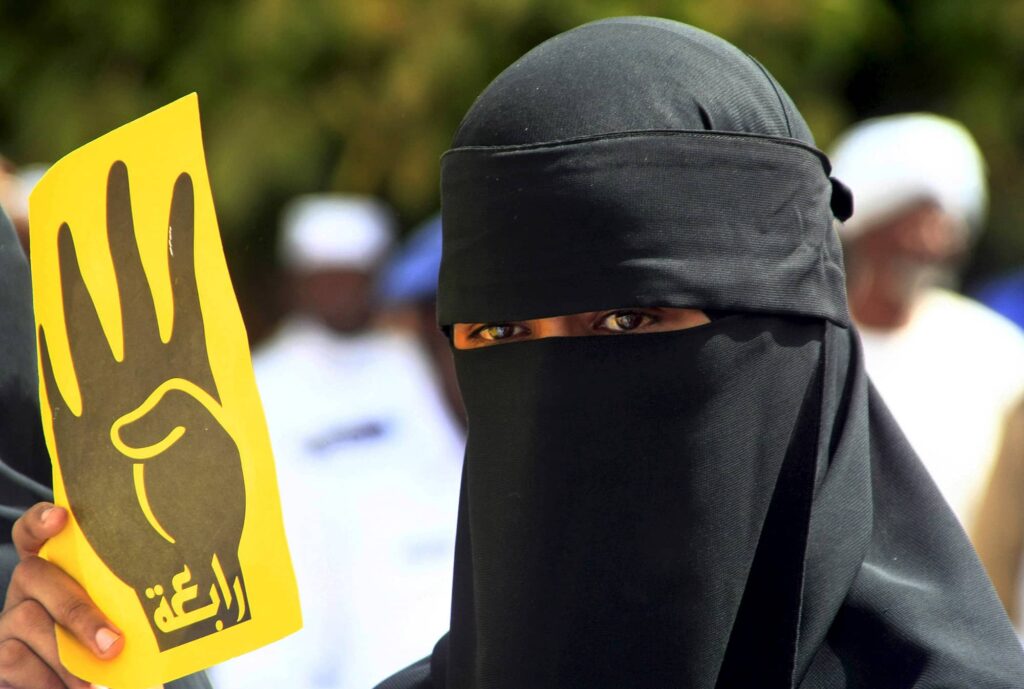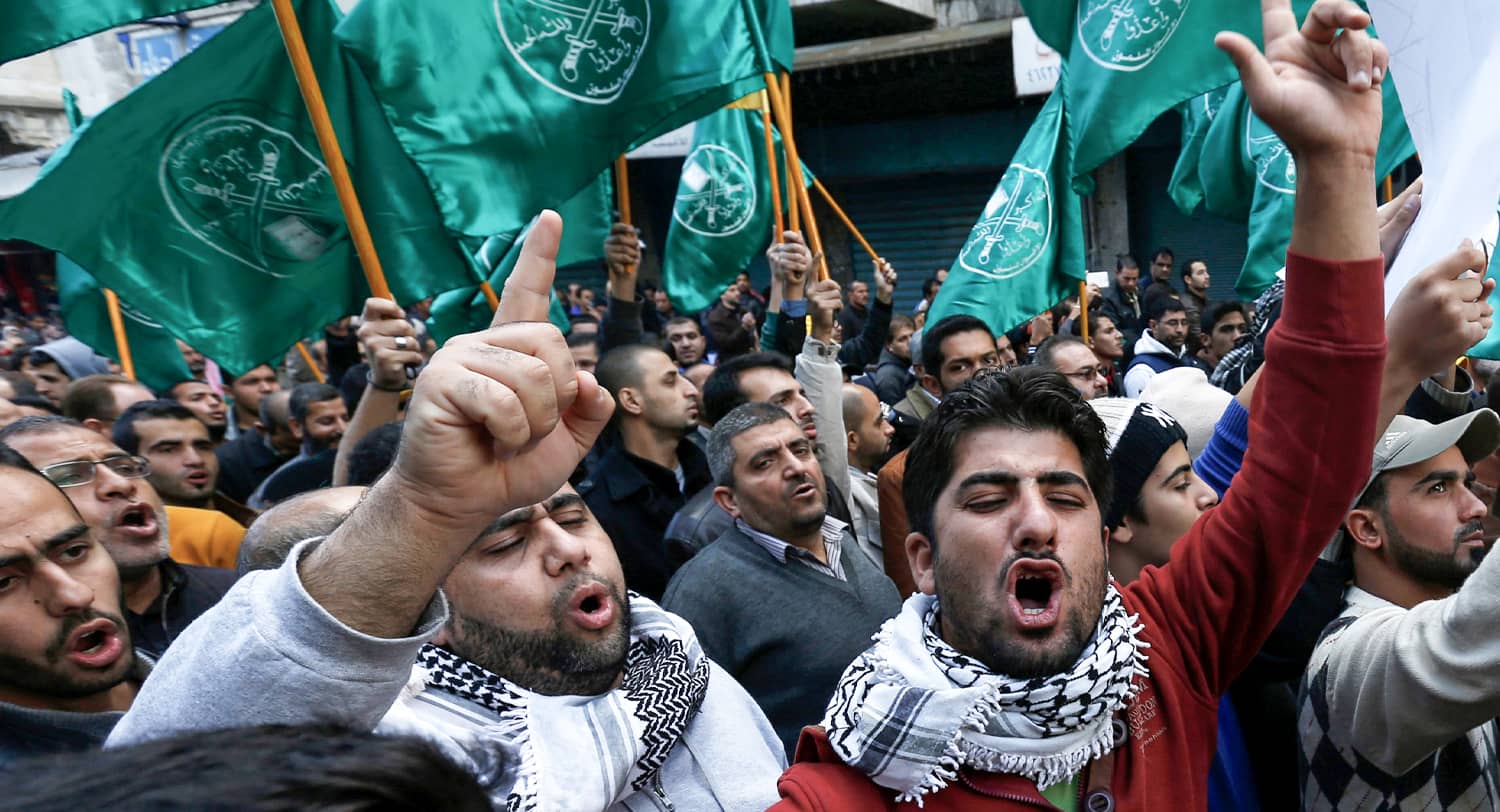“Dad, open your WhatsApp and see the [photos of] dead Jews. Your son has killed Jews.” “God bless you.” “Dad, I’m calling you from the phone of a Jew! I just killed her and her husband, with my own hands.”
– Intercepted cellphone call, October 7, from Hamas elite unit member
One unanswered question is why Hamas members publicized their brutal murders of women, children, elderly persons and other civilians. The intent wasn’t to terrorize (as Hamas did intend later by publishing pre-execution videos of hostages). The October 7 conversations and videos were shared with other Gazans in celebratory fashion. But why?
For a possible answer, one might return to the Second Intifada of 2000-2004 and the debate surrounding suicide attacks against Israeli civilians. The Islamic law of war is clear that it is impermissible to target non-combatants. But in 2004, the Egyptian Muslim Brotherhood cleric Yusuf al-Qaradawi issued a juridical declaration that all Israelis – men and women, children and elderly – are combatants and legitimate targets. Qaradawi spoke in the name of the Qatar-based Muslim Brotherhood organ he founded, the International Union of Muslim Scholars, and his declaration was promoted all over the Arabic-speaking world on Qatar’s Al Jazeera television.
The International Union of Muslim Scholars in Qatar, among other Muslim Brotherhood organs, immediately supported and promoted the massacres of October 7. In the Muslim Brotherhood worldview, killing Israeli civilians is politically sanctioned. Thus the pride and exultation of Gazans living for decades under Muslim Brotherhood rule.
Hamas, according to article 2 of its Covenant, is a constituent part of the Muslim Brotherhood. But while Hamas is a charter member (1997) of the US terrorism list, the parent organization is not on it.
The Muslim Brotherhood should be on the list. It uses different means in different places and at different times to achieve the political goal of a universal state governed by Islamic law under a single ruler, a caliph. Among its tools to achieve these political ends is violence. As such, the Muslim Brotherhood should be designated as a foreign terrorist organization under US law.
The Legal and Policy Case for Designating the Muslim Brotherhood
Under US law, the Secretary of State is authorized to designate a foreign-based entity as a terrorist organization if it practices politically motivated violence against non-combatants and if it threatens US nationals or US national security.
The key issue for designating the Muslim Brotherhood is the use of violence. In its early years in Egypt of the 1930s and 1940s, the Brotherhood openly adopted violence. Its membership oath was (and perhaps still is) administered by placing one’s hand on a gun atop a Koran. Its militia fought other groups, its “Secret Agency” assassinated political leaders, and it organized its own army to invade the newly declared State of Israel in 1948.
After its failed assassination attempt on secular nationalist Gamal Abdel Nasser in 1954 and subsequent government crack-down, the Brotherhood went underground in Egypt. It avoided violence in its own name inside Egypt, but not always elsewhere. The Brotherhood spread from Egypt to many other countries, while the Egyptian organization, its Supreme Guide and other leaders constituted an international organization that exercised influence on other national Brotherhood branches.
In Sudan, after strongman Colonel Numeiri allied with the Sudanese Muslim Brotherhood in 1981, its leader Hasan al-Turabi hosted Islamist terrorist groups like al-Qaida, Hizbullah and others in Khartoum throughout the 1980s, 1990s and into the 2000s. Much of the political violence in the turbulent Sudan of those decades was committed by Muslim Brotherhood Sudanese army officers, pursuing the organization’s Islamist goals.
Likewise in Gaza, the Muslim Brotherhood organization founded and supported the rise of Islamist terrorist organizations in the 1980s, both Hamas and the Palestinian Islamic Jihad. Hamas openly claims to be part of the Brotherhood and receives support from Brotherhood organizations elsewhere.
Most recently, the Egyptian Muslim Brotherhood has returned to violence following the army overthrow of the Brotherhood government led by President Muhammad Morsi in 2013. It conducted attacks on Egyptian military and police officers and installations, and on the Myanmar Embassy in Cairo using the names Hasm (an Arabic acronym for Forearms of Egypt Movement) and Liwa al-Thawra (Legion of the Revolution), which analysts believed to be cut-outs for the Egyptian Muslim Brotherhood.
It’s true that in some countries, notably Tunisia and Jordan, the Muslim Brotherhood operates as a political party without a terrorist affiliate. This is one of the reasons the US Government has refrained from designating the Muslim Brotherhood until now. Instead it prefers “whack-a-mole” designations of various Muslim Brotherhood offshoots or cut-outs, e.g., designating Hasm and Liwa al-Thawra, while not addressing the core terrorism problem presented by the Brotherhood.
US counterterrorism policy has nevertheless shown itself to be as tactically flexible as the terror groups themselves in non-Muslim Brotherhood contexts. For instance, the PKK based in Turkey and northern Iraq is a designated foreign terrorist organization while its Syrian affiliate, the YPG, is a tactical US ally in the anti-ISIS campaign. Likewise, there should be no contradiction between designating the Muslim Brotherhood as a foreign terrorist organization, based on its practice of political violence, while engaging in tactical contacts with its more peaceful affiliates in Tunisia, Jordan and perhaps elsewhere.
One note of caution, however, is to avoid politicizing foreign terrorist designations, as the Biden administration did in February 2021 by delisting Ansarallah (known as the Houthis) despite the lack of any evidence that it had moderated. The Muslim Brotherhood designation must be, and indeed can be, based on a solid legal case and supported by counterterrorism policy goals.

Ramifications for Foreign and Immigration Policy
Designating the Muslim Brotherhood would provide the US government with a powerful set of tools to combat the worldwide network of Hamas supporters who use Brotherhood affiliations. New avenues would allow the US Treasury to seize assets and freeze bank accounts of terrorists.
It would also provide a reason for Qatar to review its relations with both the Muslim Brotherhood and Hamas. President Biden recognized Qatar as a major non-NATO ally (a status given to 17 other countries), though Secretary of State Blinken in the past year has repeatedly asked Qatar to expel Hamas. Qatar says no, and that apparently is the end of the conversation. But after a terrorist designation of the Brotherhood, the conversation should be restarted – to avoid the prospect that Qatar could be designated a state sponsor of terrorism. Exiling Hamas might then become the low hanging fruit in the US-Qatar strategic dialogue.
For US immigration policy, the symbolic effect may be more important than its effect on numbers of Brotherhood members banned from immigrating. For instance, the great majority of imams at American mosques do not receive their professional training in the US but immigrate to the US under “special religious workers” visas from countries that have seminaries for training imams. After a Muslim Brotherhood designation, new scrutiny should be placed on those foreign seminaries to ensure new American imams are not educated in an institution affiliated with the Brotherhood.
Offsetting Domestic Concerns
The Muslim Brotherhood uses violence as one method of furthering its political goals, but other methods include religious rhetoric and imagery, often an atavistic appeal to an imagined return to a universal caliphate. The Muslim Brothers claim to represent all true believers in Islam, but of course they don’t.
I recall hearing a Brotherhood figure invited to speak to a Muslim-Jewish ecumenical conclave in upstate New York. He began by noting that one might be excused for thinking that a simple believer would look at all these Muslims congregating with Jews as sinners destined for hell. Some Muslims in the audience flinched. The speaker invoked the pure simple believer (who of course supported the Muslim Brotherhood view of the religion).
The key problem for a Muslim Brotherhood designation is not its foreign policy complications with a few countries like Qatar and Turkey, but rather domestic concerns with its potential for overbroad implementation on American Muslims. It’s a valid concern. Of course, the vast majority of mosque-going Americans aren’t in the Muslim Brotherhood. Also not every American Muslim fundamentalist is a member of the Muslim Brotherhood. The free exercise clause of the First Amendment guarantees the right to practice one’s faith including believing in the supremacy of one’s own faith. The example of some overbroad applications of the Patriot Act indicates that a Muslim Brotherhood designation could hold similar risks as well.
On the other hand, the expansion of Muslim Brotherhood networks supporting Hamas and other terrorists highlights the risks of inaction on the Brotherhood. And the risks of overbroad application can be offset by careful oversight of our law enforcement agencies and good public diplomacy with American Muslims. We need to clearly distinguish between the orthodox Islam found in most American mosques and material support, like fund-raising and recruitment, for the Muslim Brotherhood and its Hamas affiliate, Hizbullah and ISIS.
Conclusion
The war in the Middle East, and its aftershocks on American college campuses and city streets, give daily evidence of the alliance of militant Islamist organizations that Americans must oppose. For instance, on October 4, Israeli soldiers in Gaza found and freed Fawzia Sido, a young woman of the minority Yazidi faith. In 2014, at age 11, she had been enslaved by ISIS in northern Iraq and trafficked to a Hamas member in Gaza. Now ten years and two children later, she has been reunited with her family.
ISIS and Hamas are analytically two separate organizations, but they share not only common political goals but also common terrorist means. So does the Muslim Brotherhood.
American Jews in particular remain in a condition of shock from the surge of antisemitism coming at them from this Islamist alliance. But this war is not only about Jews and antisemitism. It is about all Americans, including American Muslims who don’t want the Brotherhood to define their faith to the outside world.
The foreign terrorist organization designation is an effective and legitimate tool. It should be deployed and implemented in a bipartisan whole-of-government approach to this war.

